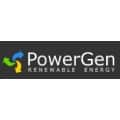PowerGen Renewable Energy
Head of Project Engineering
2 months ago
About the Job
Job Locations; Nairobi, Lagos, Johannesburg
Purpose / Overview
The Head of Project Engineering will lead the project engineering function for our Solar +BESS+ Diesel/Gas hybrid installations with or without MV/LV distribution networks, providing leadership, ensuring high standards of design, quality, and cost-effectiveness, while bridging knowledge gaps across multiple teams. She/He will oversee the full design lifecycle from concept to detailed design and commissioning, ensuring integration of electrical, mechanical, and civil elements into a unified and efficient project engineering process.
KPIs:
Accuracy and quality of project designs (minimizing errors and rework).
Efficiency in design process timelines and meeting project milestones.
Team development and ability to transfer knowledge.
Innovation and cost reduction in design methodologies.
Activities:
Leadership & Team Management:
Lead and manage the Project Engineering team, fostering a culture of collaboration, accountability, and continuous learning.
Mentor and develop engineers, particularly around solar, storage, hybrid, and grid-interactive systems, to bridge technical knowledge gaps.
Lead and manage design reviews and approvals to ensure high-quality, compliant designs.
Design & Technical Oversight:
Oversee preliminary and detailed design for Solar +BESS+ Diesel/Gas hybrid installations with or without MV/LV distribution networks, covering electrical, mechanical, and civil aspects.
Ensure designs meet technical(international), environmental, and regulatory standards.
Provide technical leadership in optimizing designs for cost efficiency, system performance, and ease of installation and maintenance.
Interface with other departments such as BD, Investments, Supply Chain etc to ensure client/project needs are met and BD leads/projects are closed.
Quality Assurance & Process Improvement:
Develop and implement engineering processes, ensuring consistency, accuracy, and quality across all designs.
Establish a robust quality control system to reduce errors, minimize rework, and manage risk in the design process.
Continuously refine and improve the engineering processes to drive efficiency and cost-effectiveness.
Project Lifecycle Activities Management:
Oversee project designs from conception to construction, ensuring designs are aligned with project goals and client expectations.
Coordinate closely with project management and construction contractors to ensure seamless transition from design to execution.
Ensure compliance with all design safety, environmental, and regulatory standards throughout the design and execution stages.
Stakeholder Management:
Collaborate with internal teams, including project management, business development, and supply chain, to align design goals with business and client needs.
Manage relationships with external consultants, suppliers, and contractors involved in the design and construction process.
Innovation & Continuous Improvement:
Stay abreast of the latest industry trends, technologies, and regulatory developments in solar, hybrid systems and MV/LV distribution.
Drive innovation in design strategies and technology adoption to enhance project performance and efficiency.
About the Company

PowerGen Renewable Energy
PowerGen was founded in Nairobi, Kenya in 2011 on the basis of two simple ideas: (1) All over the world, renewable technologies continue their ascent as the energy sources of the future. (2) Africa is poised for enormous continued growth and innovation in the decades ahead. PowerGen’s objective was to build an exciting and impactful business at the nexus of these two themes. Our first realization was that in Africa there are no shortage of good ideas, but execution is key and can prevent transformative ideas from realizing their potential. So we set out to build a first-class executional business focused on engineering, design, procurement, and installation of kW-scale off-grid solar and wind power systems in East Africa. “Over the course of 5 years, PowerGen installed hundreds of renewable energy systems across seven countries in East Africa, and built a team of more than 50 full-time professionals” Through our engineering and installation business we learned a lot about what it takes to succeed in Africa, and a more granular understanding of what the region’s energy sector needs. We realized that our clean, off-grid power systems were great, but many people couldn’t benefit from them since the up front cost is significant. We then began looking at ways we could finance these assets in order to provide energy as a service, which led us into the world of micro-grids. “We built our first micro-grid in 2013 in Zambia, and since then have installed dozens more across Kenya and Tanzania.” Over the course of 5 years, PowerGen installed hundreds of renewable energy systems across seven countries in East Africa, and built a team of more than 50 full-time professionals focused on delivering exceptional off-grid power systems to the region. We built our first micro-grid in 2013 in Zambia, and since then have installed dozens more across Kenya and Tanzania. Thousands of people benefit from the clean energy we sell to them on a pay-as-they-go basis throughout rural areas of East Africa. But our micro-grid business isn’t just about increasing energy access – it’s also about leading the charge in implementing the future energy system of Africa. Africa, with its weak incumbent infrastructure, shouldn’t be aiming to build an energy system emulating that of the US or Europe today. Instead we must be focused on building the energy system of the future, converging on where the US and Europe will be decades from now. What does this future energy system look like? It will involve on-grid storage, distributed generation, and smart metering. It will incorporate more intelligent tariffs and billing systems. It will be modular, acting more like a network composed of many semi-autonomous nodes rather than a monodirectional pipeline for commoditized electrons. Customers will be treated as customers for energy and other services, not just as ‘ratepayers’ that happen to be on the other end of a wire. At PowerGen, we are focused on building the power utility company of the future which will allow Africa to make the leap to surpass the aging power models and infrastructure of the more developed world. As the leading micro-utility company in East Africa with dozens of projects in operation, we welcome friends and partners as we work together to make this vision a reality.
Similar Jobs
Director, Project Engineering
Director, Project Engineering
- Nextracker solar
- Silpa Gram Craft Village, Hyderabad, TS, IN
- In-person
- Full time role
Optimizing solar energy with resilient, high-performance tracking technologies for affordable, renewable power.
3 months ago

Project Engineer
Project Engineer
- Energyre
- Houston, TX, US
- In-person
- Full time role
Large-scale developer of clean energy solutions transforming power generation and transmission.
3 months ago

Project Director
Project Director
- Masdar
- Tashkent Region, UZ
- In-person
- Full time role
Accelerating renewable energy through education, R&D, investment, and commercialization.
2 months ago